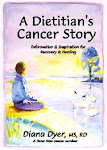 I was recently asked my opinion about the use of a product currently being promoted via multi-level marketing to cancer patients called Mona Vie, a juice with a proprietary blend of several varieties of berries, including the acai berry. Interestingly, the question came from a cancer center administrator whose husband is selling the product. Here is my response to her.
I was recently asked my opinion about the use of a product currently being promoted via multi-level marketing to cancer patients called Mona Vie, a juice with a proprietary blend of several varieties of berries, including the acai berry. Interestingly, the question came from a cancer center administrator whose husband is selling the product. Here is my response to her.*************
Thank you for visiting my web site and your thoughtful comments about my presentation and book.
My web site's Contact page does kindly request that people not send me inquiries related to products such as you have described. However, I appreciate the position you are in as a cancer center administrator and your professionalism. I am highly supportive of your caution about promoting this product and have decided to share my thoughts with you. For full disclosure, as I believe my thoughts may be of interest to a wider readership, I will also post this Q&A on my blog, most assuredly without identifying you or your cancer center in any way .
I truly understand the power of hope, and although I feel like I may be treading on eggshells with the tone of my response, I do not recommend that people "put their hope" into the product for which you have sought my opinion. It is certainly fine to drink this product occasionally as one part of an overall healthy diet. I checked PubMed today and saw there is still next to nothing published in peer-reviewed journals that shows the product your husband is selling (or acai fruit, juice, or extract) has anti-cancer activity that would make it truly unique for a cancer patient to consume to optimize cancer fighting/prevention compared to the consumption of the thousands of cancer-fighting phytochemicals that are present in berries commonly grown in this country and a plant-based diet containing a wide variety of other plant foods that are both readily available and also considerably more affordable.
Changing the way one eats each and every day is more difficult than adding any type of dietary supplement and/or functional food to a typical diet that is high in fat, sweets, meat-based, plus low in fruits, vegetables, whole grains, legumes/beans, nuts/seeds, and foods rich with omega-3 fatty acids. However, a plant-based diet such I eat and promote offers far more cancer-fighting molecules on a daily basis than can ever be contained in one product with its proprietary formula. In addition, a plant-based diet such as I consume and promote has extensive and solid research behind it to show decreased risk of heart disease, diabetes, and hypertension, too, all of which can contribute to a poor quality of life and premature death for cancer patients. I have recommended to my own family members that they put their money into purchasing more foods of higher quality versus single products such as the one your husband sells.
Here are some other thoughts from people whose opinions I respect, who do thorough research, promote "cutting edge" science-based information regarding nutrition to help fight a cancer diagnosis, and also provide extensive information on their web sites to help people with a cancer diagnosis separate information that offers hope from hype or from potential harm:
http://www.cancerdecisions.com/012906_page.html
http://www.cancerdecisions.com/020506_page.html
http://www.caring4cancer.com/go/community/forums/t/6976.aspx
In addition, here is a web site from a "competitor" of this product. I do not vouch for the accuracy of anything on this web site, but I do find the information it contains "curious", and this web site sends up many red flags in my brain about both products. http://www.powersupplements.com/acai/monavie-compare.html
I am sorry if my response seems blunt and/or if this is not the answer for which you were hoping. It is the very same answer I would have given if asked about this product in a Q&A session after a presentation. In fact, at one presentation a few years ago, I did recommend that cancer patients NOT get their nutritional advice from the "18 year old" working the supplement aisle in a health food store nor from anyone selling a product for which they received financial gain from its sale. To my great surprise the audience of hundreds of cancer patients burst into spontaneous applause and jumped to their feet to give me a standing ovation in the middle of my talk.
In contrast, I always recommend that cancer patients seek out the professional expertise of a Registered Dietitian (RD) as a component of truly comprehensive and individualized cancer care, as early after diagnosis as possible and ideally at their own cancer treatment facility to optimize discussion and coordinated care among all of the patient's health care team members. As a cancer center administrator, I know you will be very interested to hear that RDs can now sit for a specialty certification in oncology nutrition, a rigorous written examination offered through the Commission on Dietetic Registration. Many RDs are currently taking the inaugural exam, the result of a long, thoughtful, and passionate process initiated by The Oncology Nutrition Dietetic Practice Group (ON DPG) of The American Dietetic Association (ADA). Here are the websites for the certification exam and also the practice group:
http://www.cdrnet.org/certifications/spec/oncology.htm
http://www.oncologynutrition.org/index.php
Thank you again for your kind comments. I send my best wishes to you and all the patients at your cancer treatment center.
Diana Dyer, MS, RD


No comments:
Post a Comment